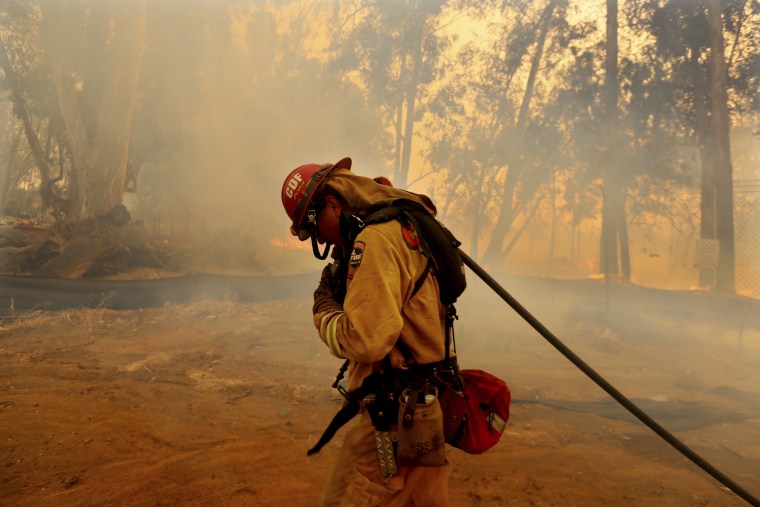Wildfires in western states have killed 103 Americans over the last 30 years, and there's ample evidence that these fires are going to grow and intensify. The Associated Press
reported yesterday, "In the past three months, at least three different studies and reports have warned that wildfires are getting bigger, that man-made climate change is to blame, and it's only going to get worse with more fires starting earlier in the year."
The recently released National Climate Assessment referenced wildfires 200 times, including this dire warning: "Increased warming, drought and insect outbreaks, all caused by or linked to climate change have increased wildfires and impacts to people and ecosystems in the Southwest. Fire models project more wildfire and increased risks to communities across extensive areas."
With this in mind, Brad Plumer
took a closer look yesterday at why the United States -- or more specifically, the U.S. Congress -- is "so unprepared" to deal with a perennial challenge.
This year, the federal government is predicting that its $1.4 billion fire suppression budget will prove inadequate for the upcoming fire season, which is expected to be especially bad given the drought in California. (The massive wildfire near San Diego last week came weeks before fire season typically gets underway.) As a result, the US Forest Service and Department of Interior expect they'll have to pull $470 million from other accounts -- including programs that are supposed to help prevent fires in the first place. That, in turn, could make future wildfires even worse. If those forecasts hold up, this will be the 7th time in the last 12 years that Congress hasn't adequately funded federal firefighting programs. Since 2002, the Department of Agriculture, which runs the Forest Service, has had to pull at least $2.8 billion from other programs in order to fight fires -- without always getting fully reimbursed by Congress. And the problem is only likely to get worse in the years ahead.
At its core, it's a matter of unforgiving math. While wildfires are becoming bigger and more common, Congress provides funding for fire suppression based on averages from the last decade.
But the model is obviously flawed: as the climate crisis grows more serious, relying on a 10-year average is a recipe for failure -- looking at the recent past provides an incomplete snapshot of public needs in the near future. It's precisely why congressional funding levels keep falling short.
Plumer
added, "[W]hen shortfalls
do happen, the Forest Service currently has to dip into other accounts to pay for firefighting -- including fuel-reduction programs that are meant to prevent fires in the first place.... That makes
future forest fires even more likely."
So why don't policymakers do something?
Some are eager to try -- the Obama administration has proposed a disaster fund that would supplement Forest Service budgets, while Reps. Mike Simpson (R-Idaho) and Kurt Schrader (D-Ore.) have introduced a bill to overhaul the funding formula.
...Aside from the fact that members of Congress always prefer rosy forecasts so they can pretend their budgets are more balanced than they really are, there are the reasons that wildfires keep getting bigger and deadlier. One culprit is poor forestry practices. There are invasive species. And there's global warming. Oh yeah: global warming. That's the big one. If Republicans in Congress acknowledged that wildfires were getting steadily bigger over time, it would be tantamount to admitting that global warming is real. And we can't have that, can we?
